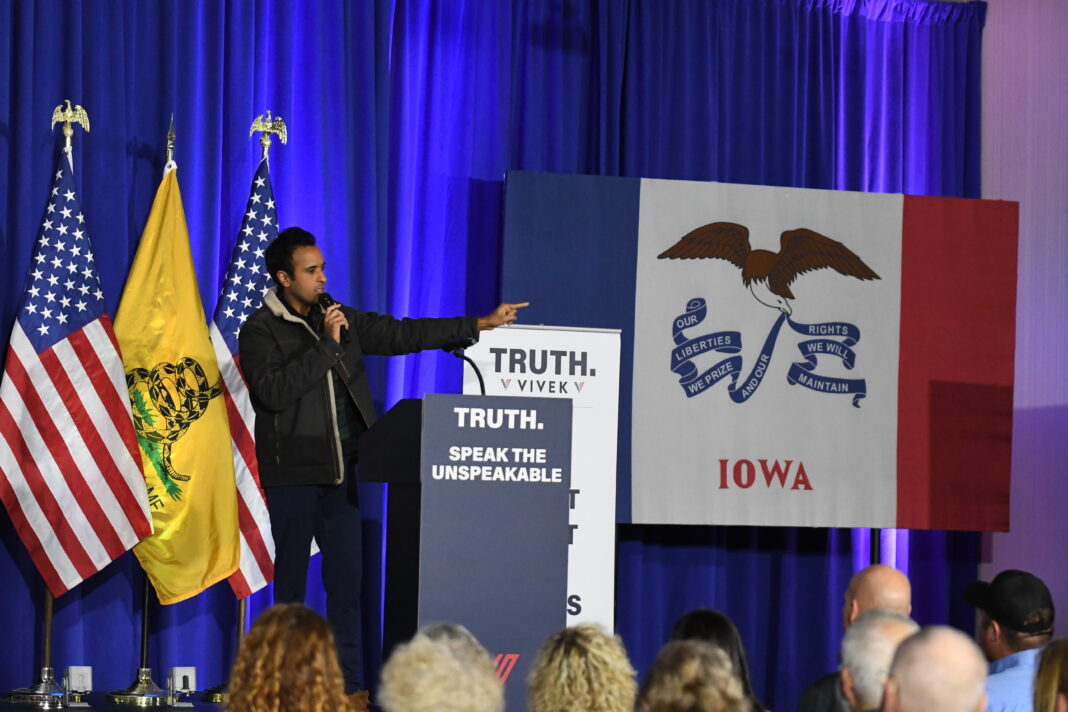Press release from Iowa Renewable Fuels Association:
Vivek Ramaswamy is attacking efforts to build carbon sequestration pipelines that would expand markets for Iowa ethanol, going so far as calling them “illegal” and those who support them as “corrupt.” He says protecting landowner rights is a fundamental principle.
But what’s the real story?
Throughout his campaign for President, Ramaswamy has called for the U.S. to be more energy independent. Often, including just this week, this rhetoric chastises President Biden for cancelling the Keystone XL pipeline. Ramaswamy says as president he would direct federal agencies to approve permits for the Keystone XL pipeline so that construction could resume.
Supporting Keystone XL while opposing carbon pipelines in Iowa is a typical political game, not driven by principles.
“Keystone is a private, foreign-owned, for-profit entity that is using eminent domain to secure its route,” stated Iowa Renewable Fuels Association (IRFA) Executive Director Monte Shaw. “Any politician who touts support for the Keystone XL pipeline while attacking carbon pipelines in Iowa on the basis of protecting property rights is nothing more than a hypocrite. Iowans are tired of seeing politicians bow down to petroleum companies while finding excuses to hamstring the future of agriculture. Unfortunately, these are the typical games we’ve come to expect from politicians running on fumes.”
Roughly 75 percent of impacted landowners have signed voluntary easements with the carbon pipeline projects in Iowa. “Farmers and landowners in Iowa overwhelmingly have supported the carbon sequestration pipelines because they know it opens up vast new markets to Iowa agriculture,” added Shaw. “That’s the fact that opponents don’t want to admit. Carbon pipelines in Iowa are a market response to the demands of our largest customers, both domestically and abroad.”
Ramaswamy Claim: Carbon Capture and Sequestration (CCS) is “not necessary.”
Reality: Iowa farmers and producers have no choice but to meet the demands of consumers. Whether or not someone agrees, growing markets require low carbon fuels including our current largest domestic and export vehicle markets. The largest emerging market, sustainable aviation fuel, is expected to reach a demand of 35 billion gallons, with world demand expected to exceed 100 billion gallons. Tapping into this market could completely transform the rural economy for Iowa farmers and producers. However, this market is not available without CCS. Carbon infrastructure, including pipelines, is a necessary part of Iowa’s future if we are to remain competitive.
Ramaswamy Claim: Ramaswamy is the “only candidate with the stones to say it,” and “I refuse to be controlled.”
Reality: Ramaswamy’s recent claims against CO2 pipelines are just at attempt at click bait for his campaign. He has spent months touting his ability as president to restart construction on the Keystone XL pipeline which used eminent domain to acquire right-of-way. We have no interest in fact-checking his stones, but his claim to be standing on principle is flawed to its foundation.
Why has Ramaswamy not spoken out on this before. Electric transmissions lines are largely privately owned and were built with eminent domain. Natural gas pipelines are largely privately owned and were built with eminent domain. Pipelines distributing gasoline and diesel fuel are privately owned and were built with eminent domain. If this is about the principle of eminent domain, then Ramaswamy falls woefully short.
Ramaswamy Claim: Carbon pipelines are “real hazards.”
Reality: Carbon dioxide is a compound that is ubiquitous in our atmosphere. We exhale CO2 with every breath. CO2 is not explosive and is nonflammable. Compare that to the 46,000 miles of pipeline in Iowa carrying natural gas, propane, crude oil, gasoline, diesel fuel and jet fuel. Pipelines carrying these explosive fossil fuels lead to fatalities every year. By contrast, CO2 pipelines have operated in the U.S. for forty years with no fatalities. Any honest discussion of pipeline safety should include these facts.
Ramaswamy Claim: No other Republican candidate is speaking about this issue in Iowa, “Presumably because it will make the Republican establishment in Iowa not look very good for their failure of farmers in Iowa.”
Reality: Carbon capture and storge is a proven technology that adds value to our farmer’s corn and soy crops. Roughly 75% of impacted Iowa landowners have supported the CCS pipelines by signing voluntary easements. It is not an overstatement to say that CCS is the key to unlocking a profitable future for Iowa farmers.
Corn prices have dropped to $2 over the past year. Brazil has ramped up corn production enough to surpass the United States as the world’s largest exporter, and Brazil is expected to double or triple corn production over the next decade. Farmers know the status quo is a recipe for overproduction and 1990s rural stagnation. Supporting CCS is not about a climate agenda for Iowa farmers and ethanol producers, it is about Iowa and Iowa farmers remaining competitive. In fact, CCS/low carbon ethanol is the single best way to push back against calls for electric vehicle mandates by those pushing a climate agenda.













My two quick comments to this article…
1. If the argument for carbon pipelines is so certain, then why not explain in this article why Navigator pulled their project out of Iowa…
2. The four simple facts that are said about CO2 in this article are true, it’s just what is NOT said here that concerns so many landowners. (Concentrated CO2 is an asphyxiant, the liquified gas will be under extreme high pressure, and emergency personnel are not prepared to respond to this type of disaster like they are for an oil leak.)